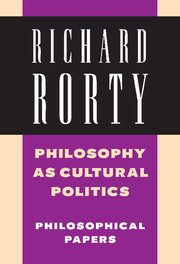Book contents
- Frontmatter
- Contents
- Preface
- Acknowledgments
- I RELIGION AND MORALITY FROM A PRAGMATIST POINT OF VIEW
- II PHILOSOPHY'S PLACE IN CULTURE
- III CURRENT ISSUS WITHIN ANALYTIC PHILOSOPHY
- 9 A pragmatist view of contemporary analytic philosophy
- 10 Naturalism and quietism
- 11 Wittgenstein and the linguistic turn
- 12 Holism and historicism
- 13 Kant vs. Dewey: the current situation of moral philosophy
- Index of names
9 - A pragmatist view of contemporary analytic philosophy
Published online by Cambridge University Press: 05 June 2012
- Frontmatter
- Contents
- Preface
- Acknowledgments
- I RELIGION AND MORALITY FROM A PRAGMATIST POINT OF VIEW
- II PHILOSOPHY'S PLACE IN CULTURE
- III CURRENT ISSUS WITHIN ANALYTIC PHILOSOPHY
- 9 A pragmatist view of contemporary analytic philosophy
- 10 Naturalism and quietism
- 11 Wittgenstein and the linguistic turn
- 12 Holism and historicism
- 13 Kant vs. Dewey: the current situation of moral philosophy
- Index of names
Summary
This chapter has two parts. In the first I discuss the views of my favorite philosopher of science, Arthur Fine. Fine has become famous for his defense of a thesis whose discussion seems to me central to contemporary philosophy – namely, that we should be neither realists nor antirealists, that the entire realism–antirealism issue should be set aside. On this point he agrees with my favorite philosophers of language, Donald Davidson and Robert Brandom. I see the increasing consensus on this thesis as marking a breakthrough into a new philosophical world. In this new world, we shall no longer think of either thought or language as containing representations of reality. We shall be freed both from the subject–object problematic that has dominated philosophy since Descartes and from the appearance–reality problematic that has been with us since the Greeks. We shall no longer be tempted to practice either epistemology or ontology.
The second, shorter, portion of the chapter consists of some curt, staccato, dogmatic theses about the need to abandon the intertwined notions of “philosophical method” and of “philosophical problems.” I view the popularity of these notions as an unfortunate consequence of the overprofessionalization of philosophy that has disfigured this area of culture since the time of Kant. If one adopts a non-representationalist view of thought and language, one will move away from Kant in the direction of Hegel's historicism.
- Type
- Chapter
- Information
- Philosophy as Cultural PoliticsPhilosophical Papers, pp. 133 - 146Publisher: Cambridge University PressPrint publication year: 2007
- 4
- Cited by



